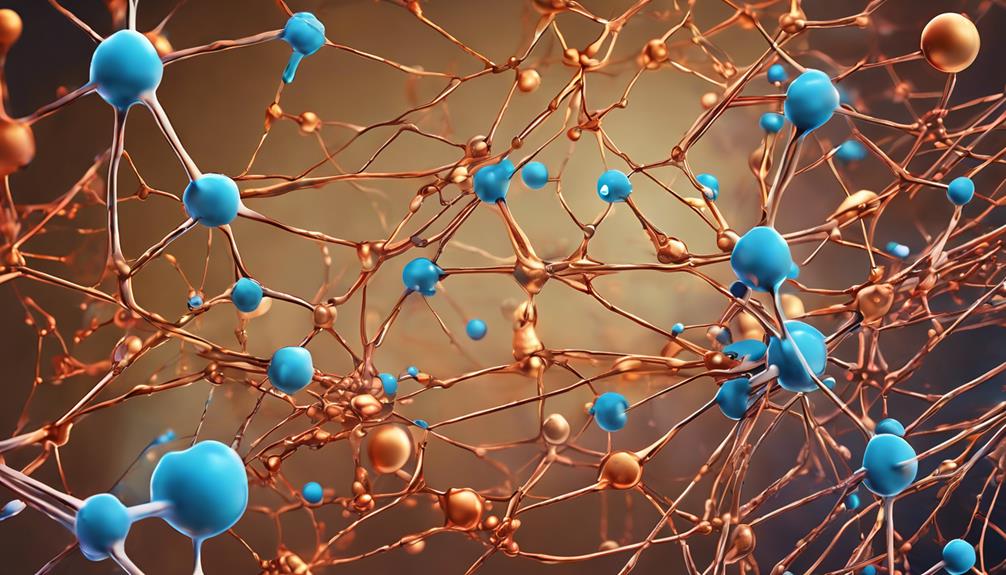Summary
- 1 Definition of trace elements
- 2 Significance in Body Functions
- 3 Role in the Regulation of Enzymes
- 4 Maintaining fluid balance
- 5 Significance in health maintenance
- 6 Contribution to General Welfare
- 7 Daily Sources and Requirements
- 8 Frequently asked questions
- 8.1 Can trace minerals be harmful if consumed in excess?
- 8.2 Are there specific populations at higher risk of trace element deficiencies?
- 8.3 How do cooking methods affect the trace mineral content of foods?
- 8.4 Are there interactions between trace minerals and drugs?
- 8.5 Can trace mineral supplements be beneficial for everyone?
Trace minerals such as iron, zinc and copper are essential nutrients needed in small amounts for various bodily functions. They play a crucial role in the enzymatic reactions, in immune support and tissue growth. Sources include fruits, vegetables, and whole grains. Animal products and fortified grains are also significant sources. Try cooking methods such as steaming to preserve mineral content. For overall health, these minerals are critical for enzyme activation and physical performance. Remember, they also contribute to the antioxidant defense and bone health. Want to learn more about how these minerals affect your well-being?
Definition of trace elements

Understand the importance of the trace minerals begins with understanding their definition and role in the body. Trace minerals are essential nutrients that the body needs in small quantities to function properly. These minerals include iron, zinc, copper, selenium, iodine, manganese, and fluoride, among others. Although they are needed only in trace amounts, they play vital roles in various bodily functions.
Trace minerals are involved in processes such as enzymatic reactions, hormone production, immune system support and maintenance of proper pH levels in the body. They also contribute to the growth and development of bones, teeth and other tissues. Although they are required in small amounts, a deficiency of trace minerals can lead to significant health problems.
To ensure that you are getting adequate amounts of trace minerals, it is essential to consume a balanced diet that includes a variety of foods rich in nutrients. Incorporating trace mineral sources such as lean meats, seafood, nuts, seeds, whole grains, fruits and vegetables can help you maintain optimal health and well-being.
Significance in Body Functions
To understand the importance of trace minerals in the body, it is essential to recognize their fundamental roles in various bodily functions. These essential micronutrients are crucial to maintaining overall health and ensuring that your body functions at its best. This is why they are so important:
- Cellular Function: Trace minerals play a significant role in cellular processes, including energy production and DNA synthesis.
- Immune System Support: Some trace minerals, such as zinc and selenium, are necessary for a robust immune system that can effectively fight infections and diseases.
- Bone Health: Minerals such as calcium, magnesium, and phosphorus are essential for maintaining strong bones and preventing conditions such as osteoporosis.
- Nervous Transmission: Trace minerals are involved in nerve signaling and muscle contractions, ensuring proper communication between your brain and the rest of your body.
- Hormonal Regulation: Some trace minerals are crucial for the production and regulation of hormones, which control various bodily functions and processes.
Role in the Regulation of Enzymes

Trace minerals are essential for regulating enzymes, which are essential for various biochemical reactions in your body. Enzymes act as catalysts, speeding up these reactions and ensuring that they occur at the rates necessary for your body to function properly. These trace minerals, such as iron, zinc, copper, selenium, and manganese, play key roles in the activation and function of enzymes.
Iron, for example, is a key component of enzymes involved in energy production and DNA synthesis. Zinc is necessary for the activity of more than 300 enzymes, including those responsible for immune function and wound healing. Copper is vital for enzymes that assist in iron metabolism and connective tissue formation. Selenium acts as an antioxidant through its role in enzyme function, protecting cells from free radical damage. Manganese is involved in the metabolism of amino acids, cholesterol, and carbohydrates.
Ensuring adequate trace mineral intake is essential to maintain proper enzyme function and support overall health.
Maintaining fluid balance
Maintaining your body's proper water balance is essential for overall health and well-being. Proper trace minerals play a critical role in ensuring that your body can effectively regulate fluid levels. Here are some key points to help you understand the importance of maintaining fluid balance:
- Electrolyte Balance: Trace minerals such as sodium, potassium and magnesium help maintain the proper balance of electrolytes in your body, which is essential for proper fluid distribution.
- Cell Hydration: These minerals also play a role in ensuring that your cells are properly hydrated, which is crucial for their proper function and overall health.
- Renal Function: Proper fluid balance is necessary for optimal kidney function, as the kidneys help regulate fluid levels in the body by filtering and eliminating waste.
- Physical Performance: Maintaining fluid balance is critical for maximum physical performance, as even mild dehydration can negatively affect your energy and endurance levels.
- Temperature Regulation: Proper fluid balance helps regulate body temperature, ensuring that you can cool yourself effectively through processes such as sweating when needed.
Significance in health maintenance

Let's talk about why the trace minerals are essential to keeping you healthy. Understanding the health benefits, knowing how much you need on a daily basis and where to get it from are all key aspects of maintaining the highest health. We review these key points to help you make informed decisions about your diet and overall well-being.
Overview of health benefits
Learn how these essential trace minerals play a key role in supporting your overall health and well-being. Trace minerals are essential for maintaining various bodily functions and promoting overall health. Here are some important health benefits you can achieve by ensuring adequate intake of these essential nutrients:
- Immune System Support: Trace minerals such as zinc and selenium are essential for a robust immune system that can effectively fight infections.
- Energy Production: Minerals such as iron and magnesium are essential for energy production in your body, helping you feel more energetic throughout the day.
- Bone Health: Calcium, in combination with other minerals such as phosphorus and magnesium, supports strong and healthy bones, reducing the risk of osteoporosis.
- Nervous System Function: Minerals such as copper and manganese play a role in maintaining a healthy nervous system, aiding in nerve signaling and brain function.
- Antioxidant Protection: Selenium and copper act as antioxidants, protecting your cells from free radical damage, promoting overall well-being.
Ensuring that you have an adequate balanced intake of these trace minerals can contribute greatly to your health and vitality.
Importance of the Daily Requirement
To maintain excellent health and well-being, it is imperative to understand the importance of meeting daily requirements for the essential trace minerals. These minerals, such as zinc, iron, copper, and selenium, play key roles in various bodily functions ranging from the immune system support at regulation of enzyme activity. Satisfy your daily trace mineral needs is crucial because they are not produced by the body and must be obtained through diet.
When your body lacks these vital trace minerals, it can lead to deficiencies that can cause health problems such as weakening of immune defenses, fatigue and even cognitive impairment. By making sure you meet the daily requirements for trace minerals, you support your general health And help prevent these deficiencies.
Therefore, pay attention to the consumption of trace mineral-rich foods and possibly consider supplementation under the guidance of a healthcare worker can help you maintain excellent health and well-being. Remember, meeting daily trace mineral requirements is a simple but powerful way to support your body's functions and promote longevity.
Sources and Absorption
Understanding where to find trace minerals in your diet and how your body absorbs them is essential to maintaining maximum health and well-being. Trace minerals are important for various bodily functions, and obtaining them from natural food sources is the best way to ensure maximum absorption. Here's how you can effectively source and absorb these essential nutrients:
- Varied Diet: Consuming a wide range of fruits, vegetables, nuts, seeds and whole grains increases the intake of trace minerals.
- Animal Products: Meat, fish and dairy products are rich sources of essential trace minerals such as zinc, iron and selenium.
- Plant Sources: Legumes, green leafy vegetables and fortified cereals can provide essential trace minerals for vegetarians and vegans.
- Cooking Methods: Cooking techniques such as steaming or baking help to preserve the mineral content in foods.
- Absorption Factors: Vitamin C improves iron absorption, while oxalates in foods such as spinach can hinder calcium absorption.
Contribution to General Welfare
Let's talk about how the trace minerals play an essential role in your overall well-being. These minerals are necessary for important health functions such as enzyme activity and hormone production, ensuring that your body functions properly. They also support the absorption of key nutrients, keeping you energized and healthy.
Vital Functions of Health
Investigating the essential health functions of trace minerals can offer valuable perspectives on their significant contribution to overall well-being. These key micronutrients play an important role in maintaining health and supporting various bodily functions. Here are some important health functions of trace minerals:
- Antioxidant Defense: Trace minerals such as selenium and zinc help fight oxidative stress, protecting cells from damage.
- Immune System Support: Minerals such as iron and copper are essential for a robust immune response, helping in defense against infection.
- Energy Production: Trace minerals such as magnesium and manganese are involved in energy metabolism, helping to convert food into energy.
- Bone Health: Minerals such as calcium and phosphorus are crucial for maintaining strong bones and teeth.
- Nervous Function: Trace minerals such as potassium and sodium play critical roles in nerve signaling and muscle function.
Understanding these important health functions underscores the importance of including a variety of trace minerals in your diet for ideal well-being.
Supporting Nutrient Absorption
Improving your body's ability to absorb essential nutrients is a key factor in promoting overall well-being. Nutrient absorption support plays an essential role in ensuring that your body can effectively use the vitamins, minerals, and other nutrients you take in through your diet.
Some trace minerals, such as zinc and selenium, are known to promote the absorption of nutrients such as iron and calcium. Zinc, for example, is vital for the production of gastric acid, which is necessary for food digestion and nutrient extraction. In addition, selenium helps regulate thyroid function, which in turn affects metabolism and nutrient absorption.
Daily Sources and Requirements

When obtaining essential trace minerals, it is important to pay attention to both their sources and daily requirements. These minerals are essential for various bodily functions, so ensuring that you are getting an adequate amount is critical to your overall health. Here are some key points to keep in mind:
- Sources of Trace Minerals
- Seafood: Fish such as salmon and shellfish are rich in zinc and selenium.
- Nuts and seeds: Almonds, pumpkin seeds and cashews are good sources of copper and manganese.
- Leafy vegetables: Spinach, kale and chard provide iron and magnesium.
- Whole grains: Brown rice, quinoa and oats offer manganese and selenium.
- Legumes: Beans, lentils and chickpeas are rich in iron and zinc.
Achieving daily requirements for trace minerals can be achieved through a balanced diet that includes a variety of these sources. Remember, these minerals play a critical role in supporting your body's functions, so making sure you consume them in the right amounts is essential for overall well-being.
Frequently asked questions
Can trace minerals be harmful if consumed in excess?
Yes, overconsumption traces of minerals can be detrimental to your health. These minerals are essential in small amounts, but if taken in excess they can lead to toxicity and adverse effects. It is important to maintain a balance and not to exceed levels of recommended daily intake To avoid potential risks to your well-being. Pay attention to your consumption to ensure you get the benefits without the drawbacks.
Are there specific populations at higher risk of trace element deficiencies?
If you are wondering which specific populations are at higher risk for deficiencies of trace minerals, it is crucial to consider factors such as age, eating habits and the health conditions. For example, the elderly, pregnant women, and individuals with certain health problems may be more prone to deficiencies. It is always a good idea to consult a health care provider or registered dietitian to determine if you are at risk and how to address any deficiencies.
How do cooking methods affect the trace mineral content of foods?
When you prepare food, the approach you choose can affect the content of trace minerals. Some minerals are sensitive to heat, so boil or steam can cause their loss. Try to minimize water use to preserve these nutrients. Roasting or grilling can also affect mineral levels, so consider incorporating a variety of cooking techniques to maintain a balanced intake of trace minerals. Remember, a varied diet and careful cooking practices can help you retain essential nutrients.
Are there interactions between trace minerals and drugs?
Yes, there can be interactions between trace minerals and drugs. Some medications can affect the absorption, metabolism or excretion of certain trace minerals in your body. It is critical to be aware of these interactions to ensure you are getting the right balance of nutrients and that your medications are working effectively. Consulting your physician or a registered dietitian can help you navigate any interactions and make informed decisions for your health.
Can trace mineral supplements be beneficial for everyone?
Yes, the trace mineral supplements can be valuable for everyone as they play important roles in various bodily functions. However, it is essential to consult a healthcare worker before starting any new supplement regimen to confirm that they are suitable for your specific needs. By addressing any potential deficiencies or imbalances, trace minerals can support overall health and well-being, but individual requirements may vary, so thepersonalized orientation is essential to achieve the best results.
